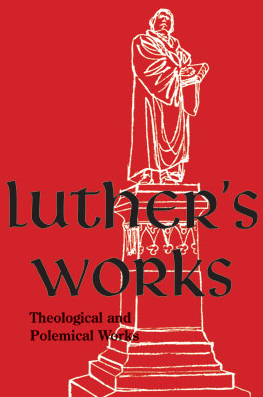
Part of Series
"The Bible is alive," declared Martin Luther, "it speaks to me; it has feet, it runs after me; it has hands, it lays hold of me." The Protestant Reformation's most prominent leader possessed a gift for evocative speech, and he was as articulate and outspoken in private as he was in public. Fortunately for posterity, some of Luther's loyal followers took note of his informal speeches. The Table Talk of Martin Luther consists of excerpts from the great reformer's conversations with his students and colleagues, in which he comments on life, the church, and the Bible. Collected by Antony Lauterbach and John Aurifaber, Luther's close associates, these absorbing anecdotes reveal the speaker's personality and wisdom. An informative introduction by editor Thomas S. Kepler describes the circumstances under which this book came into existence and the remarkable story of its initial translation into English. This text is based on the acclaimed English translation by the literary critic and essayist William Hazlitt.
Author

Martin Luther (1483-1546) was a German monk, theologian, university professor and church reformer whose ideas inspired the Protestant Reformation and changed the course of Western civilization. Luther's theology challenged the authority of the papacy by holding that the Bible is the only infallible source of religious authority and that all baptized Christians under Jesus are a spiritual priesthood. According to Luther, salvation was a free gift of God, received only by true repentance and faith in Jesus as the Messiah, a faith given by God and unmediated by the church. Luther's confrontation with Charles V at the Diet of Worms over freedom of conscience in 1521 and his refusal to submit to the authority of the Emperor resulted in his being declared an outlaw of the state as he had been excommunicated from the Roman Catholic Church. Because of the perceived unity of the medieval Church with the secular rulers of western Europe, the widespread acceptance of Luther's doctrines and popular vindication of his thinking on individual liberties were both phenomenal and unprecedented. His translation of the Bible into the vernacular, making it more accessible to ordinary people, had a tremendous political impact on the church and on German culture. It furthered the development of a standard version of the German language, added several principles to the art of translation, and influenced the translation of the English King James Bible. His hymns inspired the development of congregational singing within Christianity. His marriage to Katharina von Bora set a model for the practice of clerical marriage within Protestantism. Much scholarly debate has concentrated on Luther's writings about the Jews. His statements that Jews' homes should be destroyed, their synagogues burned, money confiscated and liberty curtailed were revived and used in propaganda by the Nazis in 1933–45. As a result of this and his revolutionary theological views, his legacy remains controversial.


